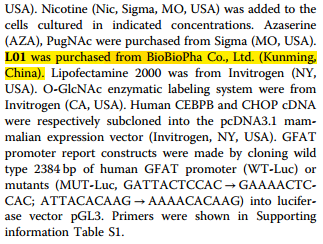Abstract:
Cigarette smoking has been shown to be a carcinogenic factor in breast cancer.Nicotine (Nic), an active component oftobacco, has been found to induce epithelial-mesenchymal transition (EMT) in breast cancer cells. However, thealterations in protein O-GlcNAcylation in Nic-mediated tumorigenesis and malignization mechanisms are lesswellstudied. Herein, we found that cellular O-GlcNAcylation dramatically increased in human breast cancer cells with EMTactivation induced by Nic. Elevated O-GlcNAcylation subsequently promoted Nic-induced EMT activation andincreased cell migratory abbility. In addition, we demonstrated that a differentiation factor for the mammaryepithelium, CCAAT/enhancer-binding protein B (CEBPB), was involved in Nic-induced hyper-O-GlcNAcylation viatranscriptional regulation of the expression of the key enzyme glutamine: fructose-6-phosphate amidotransferase(GFAT) and thus increased the flux through the hexosamine biosynthetic pathway (HBP). Finally, elevated O-GlcNAcylationof the transcriptional repressor C/EBP homologous protein (CHOP) suppressed its heterodimerizationwith CEBPB and facilitated the DNA-binding activity of CEBPB, further generating positive feedback that enhanced EMTupon Nic stimulation. In conclusion, our results have revealed a new regulatory mechanism involving CEBPB/GFAT-inducedhyper-O-GlcNAcylation that plays a key role in EMT and smoking-mediated breast cancer progression.
